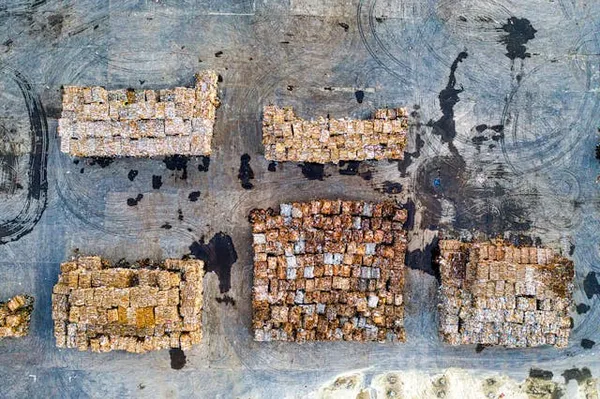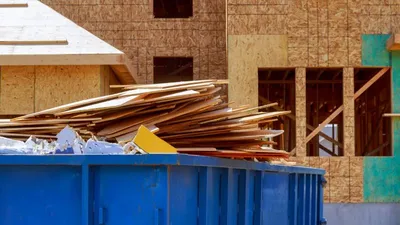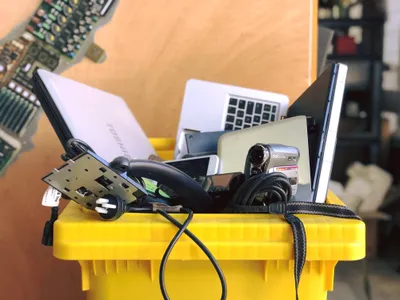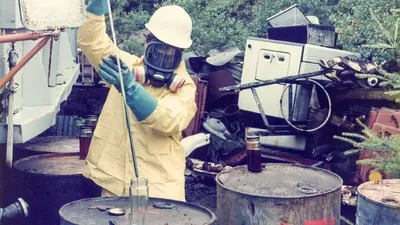Construction Debris: What You Can (and Can't) Take to the Dump
Renovating your home? Drywall, lumber, concrete, and roofing materials have different disposal rules than regular trash. Here's what to know.
Read more →Find landfills, transfer stations, and recycling centers across Iowa
119 waste disposal facilities
Iowa's waste management network serves urban centers and farming communities across the state's 99 counties. The Iowa Department of Natural Resources regulates landfills and transfer stations, with regional planning agencies coordinating services across multiple counties.
Showing 1-24 of 119 locations
Ames · 110 Center Ave, Ames, IA 50010
View DetailsBlairstown · Benton County Sanitary Landfill, 7904 20th Avenue, Blairstown, 52209, Iowa
View DetailsWaterloo · 1509 E Washburn Rd, Waterloo, IA 50701
View DetailsWaterloo · Black Hawk County Sanitary Landfill (Area E), 1509 East Washburn Road, Waterloo, 50701, Iowa
View DetailsBoone · Boone County Landfill, 1268 224th Lane, Boone, 50036, Iowa
View DetailsGrinnell · 3973 20th St, Grinnell, IA 50112
View DetailsStorm Lake · 1263 630th St #1263, Storm Lake, IA 50588
View DetailsAllison · 25251 IA-3, Allison, IA 50602
View DetailsCarroll · Carroll County Sanitary Landfill, 19111 Kittyhawk Avenue, Carroll, 51401, Iowa
View DetailsCarroll · 19111 Kittyhawk Ave, Carroll, IA 51401
View DetailsAtlantic · Cass County Sanitary Landfill, 65928 Jackson Road, Atlantic, 50022, Iowa
View DetailsCedar Falls · 1524 State St, Cedar Falls, IA 50613
View DetailsMarion · Cedar Rapids Linn County Solid Waste Landfill #2, 1954 County Home Road, Marion, 52302, Iowa
View DetailsCedar Rapids · 500 15th Ave SW, Cedar Rapids, IA 52404
View DetailsMarion · 1954 County Home Rd, Marion, IA 52302
View DetailsCedar Rapids · 2250 A St SW, Cedar Rapids, IA 52404
View DetailsLake Mills · 21265 - 430th St., Lake Mills, IA 50450
View DetailsCherokee · Cherokee County Sanitary Landfill, 1805 Linden Street, Cherokee, 51012, Iowa
View DetailsIowans generate approximately 2.8 million tons of solid waste annually, with the Iowa Department of Natural Resources (DNR) regulating landfills, transfer stations, and other facilities to protect the state's land, water, and air resources. The DNR Solid Waste Program oversees facility permitting, compliance monitoring, and comprehensive planning while promoting waste reduction and recycling. An interactive landfill map shows all operating and closed facilities, including property boundaries and waste acceptance limits.
Most Iowa counties participate in regional solid waste planning agencies that coordinate services across multiple jurisdictions. These agencies operate landfills, transfer stations, and recycling programs, providing economies of scale that benefit smaller rural communities. Contact your regional planning agency to locate facilities and learn about programs in your area. The DNR Solid Waste Permitting portal provides facility contact information for landfills, transfer stations, composting operations, and household hazardous waste collection centers.

Disposal fees vary by region but typically run $30 to $45 per ton for municipal waste. Residential self-haul loads are often charged flat rates of $15 to $35 depending on vehicle size, with some facilities offering discounts for separated recyclables. Many facilities participate in the tonnage fee system that helps fund state solid waste programs. The State Revolving Fund offers low-interest loans for landfill closure projects and related infrastructure like transfer stations.
Agricultural plastic recycling addresses the substantial volume of grain bags, silage covers, bale wrap, and chemical containers generated by Iowa's farming operations. Several regional programs and agricultural cooperatives accept these materials for recycling. Pesticide and chemical containers must be triple-rinsed before recycling to remove residues. Contact your regional planning agency or local co-op for collection locations and requirements specific to agricultural materials.
Household hazardous waste collection events occur throughout Iowa, typically in spring and fall, with some urban areas maintaining permanent collection sites. These events accept paint, pesticides, automotive chemicals, batteries, and other materials that shouldn't enter regular trash or landfills. Most programs accept materials free from Iowa residents. Regional household hazardous waste collection centers provide year-round options in some areas. Check the DNR website or contact your regional agency for schedules and locations.
Learn how to properly dispose of common items.

Renovating your home? Drywall, lumber, concrete, and roofing materials have different disposal rules than regular trash. Here's what to know.
Read more →
E-waste rules vary wildly by state. Some ban electronics from landfills entirely. Here's how to recycle old TVs, computers, and phones properly.
Read more →
Most counties run free household hazardous waste collection events. Here's what qualifies, how to find your local event, and how to store stuff safely until then.
Read more →